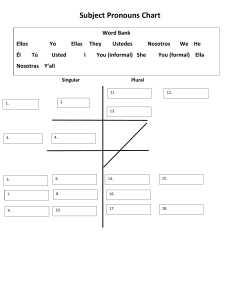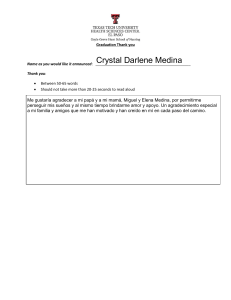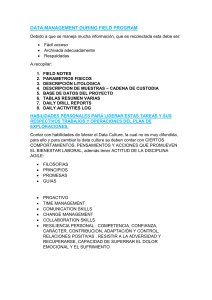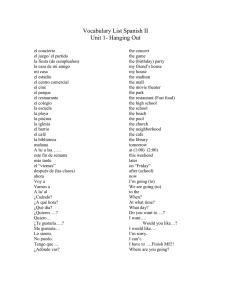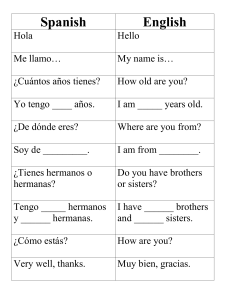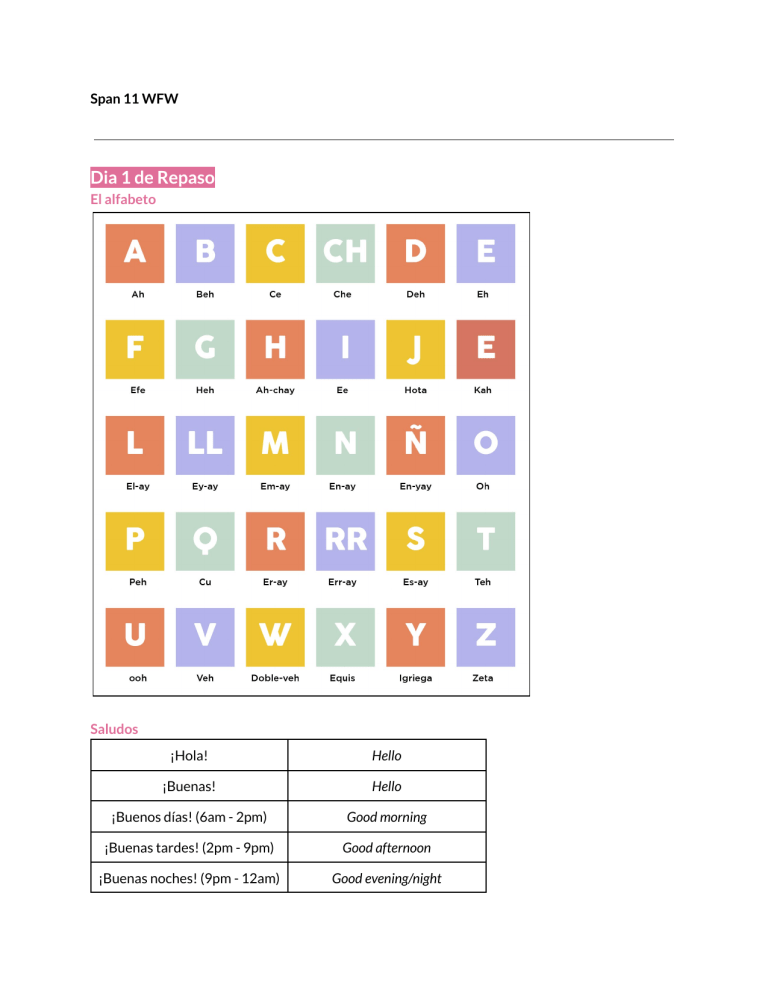
Span 11 WFW Dia 1 de Repaso El alfabeto Saludos ¡Hola! Hello ¡Buenas! Hello ¡Buenos días! (6am - 2pm) Good morning ¡Buenas tardes! (2pm - 9pm) Good afternoon ¡Buenas noches! (9pm - 12am) Good evening/night ¡Bienvenido! Welcome Preguntar cómo está la persona ● P: ¿Cómo estás? ○ R: bien / estoy bien / mal / estupendo, fenomenal / asi asi ➔ Soy bueno - I am a good person ➔ Estoy bueno/a - I am hot/good-looking ➔ Soy bien - incorrecto ● ¿Y tú? - And you? Despedidas ¡Chao! Goodbye ¡Adios! Goodbye ¡Hasta luego! See you later ¡Hasta pronto! See you soon ¡Hasta mañana! See you tomorrow ¡Hasta el…lunes/martes/miércoles…” See you on *day* Nos vemos See you Hasta la próxima (clase) Until next time/ Until next class Hasta la vista See you around Presentarse (introductions) ● P: ¿Cómo te llamas? - What is your name? ○ R: Me llamo… ○ R: Soy Mayee ● P: ¿De dónde eres? / ¿Dónde vives? - Where are you from? / Where do you live? ○ R: Vivo en Marikina ○ R: Soy de Filipinas ○ R: Soy Filipina/o ● P: ¿A qué te dedicas? - What do you pursue? ○ R: Soy un camarero. ○ R: Soy una profesora ○ R: Trabajo como profesor. ● P: ¿Qué estudias? - What do you study? ○ Estudio Bellas Artes, Creativa Escritura ○ Estudio educacion primaria ● P: ¿Cuántos años tienes? - How many years do you have? How old are you? ○ Tengo 25 años. ● P: ¿Cuál es tu número de teléfono? ○ Mi numero de telefono es seis, cero, cinco, nueve, cinco, cero, cero, tres, cinco 605950035 (cero, uno, dos, tres, cuatro, cinco, seis, siete, ocho, nueve, diez) Pronombres en Español ● Yo ● Tú ● El/ella/usted ● Nosotros ● Vosotros ● Ellos/ellas/ustedes Conjugaciones Llamarse (to be called) Ser (to be permanent) Vivir (to live) Tener (to have) Estar (to be temporary) Yo Me llamo Soy Vivo Tengo Estoy Tú Te llamas Eres Vives Tienes Estás El/ella/usted Se llama Es Vive Tiene Está Nosotr@s Nos llamamos Somos Vivimos Tenemos Estamos Vosotr@s Os llamais Sois Vivis Teneis Estáis Ell@s/ustedes Se llaman Son Viven Tienen Están ● Ser - personality, physical characteristics, ● Estar - state, temporary, localization ● Important: Your conjugation depends on your subject ○ Changes depending on the ‘type’ of person you are talking about Dia 2 de Repaso Las preguntas ● P: ¿Cómo se llama? ○ R: Se llama Rosalía ➔ When the question is for el/ella/usted, the answer will also be for el/ella/usted ● P: ¿De dónde eres? ○ R: Es de Barcelona ● P: ¿A qué se dedica? ○ R: Es una bailarín de flamenco y una cantante. ● P: ¿Cuántos años tiene? ○ R: Tiene 30 años La familia Madre /Mamá Mother Cuñad@ Brother/sister-in-law Padre/Papá Father Novi@ Boy/girlfriend Herman@ Brother/sister Suegr@ Father/mother-in-law Abuel@ Grandfather/mother Espos@ Husband/wife Tí@ Uncle/aunt Niet@ Grandson/daughter Prim@ Cousin Padrin@ Godfather/mother Sobrin@ Niece/nephew Hij@ Son/daughter Madrasta Stepmom Amante Lover Padrastro Stepdad ¿Cómo es…? ● What is she like? ● What does she look like? ● ¿Cómo es Jay? ○ Jay es viejo. ● Subject-verb agreement Sujeto (subject) Verbo Adjectivo Gender Jay es Viejo (old) *masculino/singular Lily es Joven (young) Delgada (thin) *femino/singular ● ¿Cómo son Gloria y Manny? ○ Masculino porque tener 1 chico, plural Ellos/Gloria y Manny son Colombianos. (optional) son morenos. Ellas/Alex y Haley son hermanas. (optional) son graciosas. ● ¿Cómo son Alex y Haley? ○ Femenino, plural Tener (to have) ● What you possess ● What you own ● Important: focus on the thing that you own rather than the person who owns it Tengo dos gatos (I) - singular (2) - plural Cats - plural Tengo muchas muchos novias novios Mi hermano tres coches. La casa tiene tres plantas. (three floors) Hay 2 plantas en la casa. There is/are two floors in the house ● Recordar: ○ Verb agrees with the noun ○ Adjective agrees with the thing that you own ○ Ejemplos: ➔ Hay una mesa. (singular) ➔ Hay unas mesas. (plural) “a”/Some Singular Plural Un Una Unos Unas ● Ejemplos: ○ Tengo un folio. ➔ I have a folio. ○ Tengo unos folios. ➔ I have a folios. ○ Tengo una novia. ➔ I have a girlfriend. ○ Tengo unas novias. ➔ I have some girlfriends. ● Las partes del cuerpo no se poseen en español (parts of the body are not owned in Spanish) ○ Tiene el pelo *adjective* y los ojos *adjective* ○ Tiene el pelo negro y los ojos marrones. ➔ He/she has black hair, and brown eyes. ● En español, posesemos nuestros edades (in Spanish, we own our age) ○ Tengo 25 años. ➔ I have 25 years. Concordancia de género y número ● El adjetivo debe concordar en género y número con el sustantivo al que modifica ○ The adjective must agree with the gender and number of the noun it modifies El resumen ● F - femenino, M - Masculino, S - singular, P - plural Las frases (the sentences) Esta es una foto (fotografía) This is Vivimos en Madrid. Somos Filipinos. Somos del Ateneo. *Del - de el El pelo del perro. The hair of the dog / the dog’s hair Nathan y Carlo son altos. Tienen el pelo negro Esta es F/S S Vivimos Somos Filipinos Nosotros (WE) Plural Masculino/Plural Nathan y Carlo son altos Ellos (M/P) M/P Tienen el pelo negro Nathan y Carlo has Black hair Plural M/S y los ojos marrones. Los ojos marrones (M/P) Mona y yo somos amigas. Mona y yo somos amigas. Femenino / Plural Femenino / Plural Mona tiene el pelo largo y rizado. Mona tiene. el pelo largo y rizado Mona has Long and curly hair Ella (F/S) M/S Tengo el pelo corto y oscuro. El pelo - corto y oscuro (short and dark) Tenemos los ojos pequeños. Tenemos los ojos pequeños We have Small eyes. (M/P) Ellos son Mis mejores amigos They are My best friends. M/P M/P Ellos son mis mejores amigos. Dia 3 de Repaso Plurality & gender ● Like other adjectives: possessive adjectives have to change for their feminine and plural forms Singular Plural Yo Mi Mi novia Mis Mis novias (My girlfriends) Tú Tu Tu novia Tus Tus novias (Your girlfriends) El/ella/usted Su Su novia Sus Sus novias (His/her girlfriends) Nosotro@s Nuestr@ Nuestra clase Nuestr@s Nuestros clases (Our classes) Vosotor@s Vuestr@ Vuestra tarea Vuestr@s Vuestros tareas (Your homeworks) Ell@s/ustedes Su Su clase Sus Sus clases (Their classes) ● First look at the noun (see if it is m/f, singular/plural) ○ Ejemplos: ➔ Mis padres ➔ Su hermano ➔ Tu hermana ➔ Nuestra mama ➔ Vuestro examen ➔ Sus examenes Preposiciones del lugar ● Distancia ● La posición en relación con otra cosa Cerca Near Encima de Above/on top Lejos Far Debajo de Below/under Aquí Here Dentro de Inside Ahí There (can still see) Guera de Outside Allí (<aji/ayi>) There (far, cannot see anymore) En On/in Detras de Behind Enfrente de / delante de In front of A lado de Beside A la izquierda de To the left of A la derecha de To the right of Alrededor de Around Medio de / entre … y Between En medio In the middle Dias de semana ● ● ● ● ● ● ● lunes martes miercoles jueves viernes sabado domingo Meses de año ● ● ● ● ● ● ● ● ● ● ● ● enero febrero marzo abril mayo junio julio agosto septiembre octubre noviembre diciembre Fecha de hoy ● Hoy es viernes ● Es el veintinueve de septiembre dos mil veintitrés (29/09/2023) Numeros ● ● ● ● ● ● ● Cien Ciento Doscientos uno Mil Dos mil Un millon Dos millones Estaciones ● El verano (junio - agosto) ○ Summer ○ La playa ○ Vamos a la playa/la piscina ➔ Let’s go to the beach/pool ○ Tomar el sol ○ Bañarse ➔ To take a bath (to swim only in the beach in terms of swimming BUT can be for actually bathing in the bathroom) ➔ Me baño en el mar ○ Nadar ➔ To swim (as in the sport) ○ El mar ➔ The sea ○ La arena ➔ The sand ● El otoño (septiembre/noviembre) ○ Autumn ○ Hacer senderismo ➔ To take a hike ○ Cuando caen las hojas ➔ When the leaves fall ➔ Oja de papel (leaf of paper) ○ El altre/viento es fresco ➔ Aire - air ➔ Viento - wind ○ Llevar tu abrigo ➔ Llevar - to wear ➔ Wear your coat ● El invierno (diciembre - febrero) ○ Winter ○ Nieva - it snows ➔ Nevar - to snow ➔ Nieva - it snows ○ Está nevando - it’s snowing ○ La nieve ○ Cielos despejados - clear skies ➔ Cielo - the sky ○ Hielo - ice ○ Frío - cold ➔ Tengo frio - I’m cold ● La primavera (marzo - mayo) ○ Spring ○ Los hojas crecen de nuevo ○ Ir a la playa pero bañarse ○ Ir al parque ○ Llueve - it rains ➔ Llover - to rain ○ Está lloviendo - it’s raining ○ La lluvia El tiempo atmosférico ● Esta (it is) + *verb* ○ Nublado - cloudy ○ Despejado - clear sky ○ Lloviendo - raining ○ Nevando - snowing ○ Esta nublado en Santander pero hace sol ➔ It is cloudy in Santander but there is sun ● Hay (there is) + *noun* ○ Tormenta - storm ○ Niebla ○ Remolina ○ Relámpagos - lightning ○ Truenos - thunder ○ Huracán - tornado ● Hace ○ Calor ○ Frío ○ Sol ○ Viento ○ Buen tiempo ○ Mal tiempo ● Tengo ○ Calor ○ Frío ● Mas vocabulario ○ El nube / los nubes ○ La lluvia (llover) ➔ Llueve - it rains ○ La nieve (nevar) ➔ Nieva - it snows ○ Despejar - to clear ○ Caliente vs calor ➔ Caliente - for people/objects like tea ➔ Tengo calor - I am hot ¿Que tiempo hace (hoy)? ● Las Filipinas ○ Color ○ Más calor ○ Seco ○ Húmeda Much@ vs. Muy ● Mucho/a ○ Sustantivos ○ Verbos ○ EJ. Tengo muchos primos. ➔ I have a lot of cousins. ● Muy ○ Adjetivos ○ Adverbos ○ EJ. Estoy muy cansado. ➔ I am very tired. ¿Que hora es? ● Es la una ○ For 1-1:30 ● Son las *2-12* ○ For 2-12 ○ EJ. son las dos menos cuarto de la mañana ➔ It’s 1:45 a.m. Menos vs. cuarto ● EJ. son las diez menos veinte de la noche ○ It’s 9:40 p.m. ¿A que hora es? ● P: ¿Que hora es? ○ What time is it? ➔ R: Es/Son la/s __. ● P: ¿A que hora es __? ○ What time is __? ➔ R: A la/A las __. ● ¿A qué hora es nuestra clase? ○ Nuestra clase es a la una. ➔ “a” = at ● ¿A qué hora desayunas? ○ Desayuno a las ocho de la mañana. Time of Day ● De la mañana ● De la tarde ● De la noche ● Mediodia ● Medianoche Verbos en Presente Verbos Irregulares Verbs containing -o in the stem changes into -ue Verbs containing -e in the stem changes into -ie -e in the stem changes into -i Irregular verbs Dormir Perder Vestir Tener / ir / hacer Duermo Pierdo Visto Tengo Voy Hago Duermes Pierdes Vistes Tienes Vas Haces Duerme Pierde Viste Tiene Va Haces Dormimos Perdemos Vestimos Tenemos Vamos Hacemos Dormeis Perdeis Vestis Teneis Vais Haceis Duermen Pierden Visten Tienen Van Hacen nosotr@s/vosotr@s does NOT change Verbos Reflexivos ● Verbs that have the same subject and object ● You do it unto yourself ● Ejemplos: ○ Me ducho por la mañana ➔ I shower (myself) in the morning ○ Me gusta ducharse ➔ I like to shower (myself) ➔ Ducharse is the object of your sentence ➔ Talking about the act itself Despertarse ** To wake up Levantarse To stand up Sentarse ** To sit down Afeitarse To shave Cepillarse To brush Acostarse ** To lie down Bañarse To bathe Vestirse ** To get dressed Vs. vestir - to wear Dormirse ** To go to sleep Vs. dormir - to sleep Lavarse To wash (oneself) Llamarse To be called Perderse ** To get lost Vs. perder - to lose ** irregular verbs Subject Pronoun Reflexive Pronoun Meaning Ejemplo Meaning Yo Me Myself Me lavo I wash (myself) Tú Te Yourself Te lavas You wash (yourself) El/ella/usted Se Him/her/itself (oneself) Se lava He / she / it washes (him/her/itself (oneself) Nosotr@s Nos Ourselves Nos lavamos We wash (ourselves) Vosotor@s Os Yourselves Os lavais You wash yourselves Ell@s/ustedes Se Themselves Se lavan They wash themselves Yourselves You wash yourselves Verbos Reflexivos Irregulares Acostarse (to lie down) [can be same use for dormir] Despertarse (to wake up) Perderse (to get lost) Vestirse (to get dressed) Me Acuesto Despierto Pierdo Visto Te Acuestas Despiertas Pierdas Vistes Se Acuesta Despierta Pierda Viste Nos Acostamos Despertamos Perdemos Vestimos Os Acostais Despertais Perdeis Vestis Se Acuestan Despiertan Pierden Visten nosotr@s/vosotr@s does NOT change Sentarse (to sit down) Dormirse (to go to sleep) Me Siento Duermo Te Sientas Duermes Se Sienta Duerme Nos Sentamos Dormimos Os Sentais Dormis Se Sientan Duermen nosotr@s/vosotr@s does NOT change ● Te quiero / Te amo (I love you) are NOT REFLEXIVE ○ “Te amo” is used for very strong love (EJ. for your mother) ○ “Te quiero / Te quiero mucho is used for someone you like, your friends, etc. ➔ I want you Habitos Me El Fin de Semana ● What you usually do on the weekend? Te Le Ir de compras To go shopping Ir a conciertos To go to concerts Lavar la ropa To wash clothes Limpiar la casa To clean the house Pasear To stroll Montar en bicicleta To ride a bike [*montar is specific to something you can mount] Cocinar To cook Ir al campo To go to the countryside Ir a la montaña To go to the mountains Esquiar To ski comer/cenar fuera To eat / dine outside Hacer deporte To do sports Hacer la compra To do groceries Ir de copas OR tomar algo To go drinking OR to have a drink Ver exposiciones To see exhibits Hacer gimnasia To go to the gym / to do gymnastics Gustar + infinitivo Nos + gusta + infinitivo Os Les ● Ejemplos: ○ Me gusta limpiar mi habitación. ➔ I like to clean my room. ○ ¿Te gusta ir a la playa? ➔ Do you like to go to the beach? ● Tambien: to agreeing to liking something also (+) ● Tampoco: to agreeing to NOT liking something also (-) ○ Ejemplos: ➔ Persona A: No me gusta beber leche. ➔ Persona B: A mí tampoco. OR Yo tampoco. Planes ● Ir + a + infinitivo ● ¿Qué vas a hacer este fin de semana? ○ What are you going to do this weekend? ● Conjugate ir ● Ejemplos: ○ Voy a bailar esta noche. ○ Vas a viajar a HK. ○ Va a ver un partido baloncesto. ○ Vamos a tener un examen. ○ Vais a leer los libros. ○ Van a estudiar en la biblioteca. ● Vocabulario: Dormir To sleep Estudiar To study Leer To read Salir con mis amigos To go out with my friends Jugar (deporte) To play something Tocar la guitarra To play the guitar To Know Saber Conozer Sé Conozco Sabes Conoces Sabe Conoce Sabemos Conocemos Sabeis Conocéis Saben Conocen ● No sé cómo se dice “@” en español. ○ I do not know what “@” is in Spanish. ● Te conozco. ○ I know you. ● Conozco dos países de habla hispana. ○ I know 2 Spanish-speaking countries. ● Rule: if a verb ends in -cer/-cir, change to -zco !!! ○ EJ. conducir Conduzco Conduces Conduce Conducimos Conducis Conducen ● Cual es tu libro favorito? Saludos Subtopic ● Production = crafts ● 0.15, 0.15 ○ 0.35, 0.15 ➔ 0.55, 0.25 ● #e06f99
